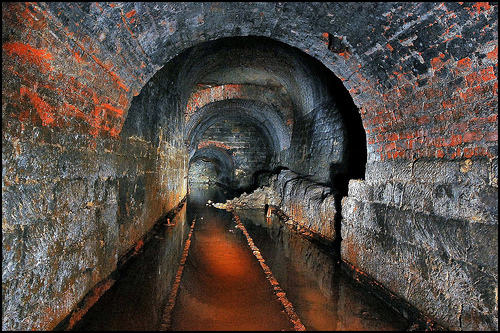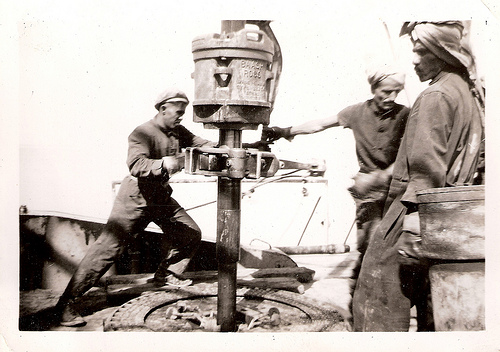A strange way of viewing man’s activities on earth occurred to me a few days ago – the economic point of view. We often hear of moral or scientific arguments but not many economical ones. Let me explain what I mean.
Natural Resources – Artificially low prices
There’s something skewed about the price we pay for the products we consume and the fuel we burn. To take an example, I bought a plastic bag today at Aldi’s (I had to – needed to walk 2.5 km back home with groceries) for 10c. It’s so cheap that one wouldn’t mind paying for it at all.
And yet, that plastic bag poses a real problem as far as its effects go. Depending on the type of plastic, it can take anywhere from 20 to 700 years to decompose naturally in a landfill and it’s incredibly difficult to recycle. You don’t want to try burning it either because quite apart from the horrible smell (as anyone who has smelt plastic burn can attest), it could – again depending on the plastic – release toxic dioxins.
Doesn’t something feel wrong to you here? How can it be possible that items that are so easily available cause such a terrible nuisance? It got me thinking about the supply chain and how each person in the chain pays for the raw materials and the labor and charges the next buyer the cost + markup. When I reached the beginning of the chain however, a curious fact struck me. The first link in the chain was getting the raw material for free!
Image Credit: phill.d

- Mineral extraction for free
Taking the plastic bag for example, we see that plastic is something of a byproduct of crude oil. And while it has passed through several steps, the first person to extract the crude oil got it for free. You may point out that they’re taking efforts to extract it, but in all other industrial processes, raw materials themselves must be paid for separately from the labor.
And of course when the product is being obtained for free, the end product becomes that much cheaper. Imagine for a moment that oil drillers had to pay for the actual oil that was extracted as well as the labor – do you think that fuel would be as cheap as it is now? Even if they bought the property under which the oil exists, who did they buy it from? Somewhere down the line, the original owner got the land for free.
The real cost of environmental resources
The question to now ask is, how much should we be “charged” for extracting resources? Of course, nature is like a large Non Profit Organization who is perfectly willing to sell us the resources at cost price. But what is the cost price? In any transaction, the seller must not be worse off than before. For the extraction of any resource, the price must be at least that which compensates nature for any damage done to her while consuming it.
Reverting once more to our plastic example, the price of the crude oil that was “sold” to us initially by nature in order to make it, must at the very least take care of the environmental impact caused by disposing it. In other words, the extractor of the oil must also pay for a process that will offset the negative effects caused by the manufacture and disposal.
Obviously these costs will be passed up along the chain and the price of the end products will then reflect their true cost instead of the artificially low prices we pay today. Everything from fuel, plastic, paper, electricity (from coal), and metals needs to be much more expensive than they are now. The end result will then be a sustainable and responsible way of consuming the earth’s resources.
Image Credit: David C. Foster

- The cost of extracting natural resources
The “income” of nature
Nature has a way of generating resources naturally over a period of time, and taken all at once it generates a considerable “income.” To this extent, we’re free to make use of nature’s resources without paying any cost at all since nature is like a rich person who likes to give off all her profits to the poor. For this reason cows and deer can eat grass and tigers can kill cows for free (in a manner of speaking). They don’t harm the environment by taking resources since they don’t take much – and there’s a natural check on their activities in the form of predators. Moreover if they overdraw resources, they die out.
The moment humans start drawing more than is earned, we must begin the pay the real price. Sometimes resources can really be free such as solar energy – the direct use of which doesn’t seem to have harmful effects and so can continue to be free. Not so for minerals, fossil fuels and forests. They must be paid for when extracted in bulk. If we don’t, we’ll end up facing the harmful effects that will inevitably result.
Seen from this standpoint, it’s so obvious what we have to do. Let us hope that sooner rather than later we can summon up the will to do it.


Bhagwad, You article was able to provide all the points required to proove your point. I do agree with the way we are extracting all the available blood from mother nature’s veins. We should in turn provide her with energy drink (through planting trees, conserving forest and so on).
A very good decision I came across on my visit to Manali (Himachal Pradesh). There exist a political will on the ban of use of plastic bags that can ruin the serene nature. We need these regulations and indeed their execution. Else we are not far from our own Killing (I will prefer the word ‘Killing’ instead of ‘Suicide’ as it contains an act of force)
@Sajid
Banning plastic bags is definitely a good step – the same was implemented in Ooty as well. In other cities such as Mumbai,there are restrictions on the thickness and since it's quite difficult to measure that on the spot, the whole issue is a mess.
One day I'll write a post on the Great Pacific Garbage Patch which is present in our oceans right now. We all know what must be done, but as you said, the political will is lacking and that has its roots in the wishes of the people. So the ultimate solution has to come from the people. No getting around that.
We are going to be laughed at by our children, for sure.
@Mumbai Paused
I often think of that! I mean they're going to look back at us and say "How could they have been so dumb!
And welcome aboard :)
If one wishes to learn more about “real cost” of natural resource utilization, can you provide current points of contact?
Club of Rome, affiliates and off-shoots have similar concerns but they are larger organizations seemingly with celebrity status memberships.
Thx